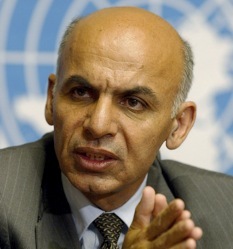Great Throughts Treasury
This site is dedicated to the memory of Dr. Alan William Smolowe who gave birth to the creation of this database.

Ashraf Ghani
Afghani Politician, Chancellor of Kabul University, Chairman of the Institute for State Effectiveness,Finance Minister of Afghanistan, World Bank, key figure in rebuilding Afghanistan after the fall of the Taliban, and is a leading advocate for foreign investment (rather than foreign aid)
"Politics is a vocation; it’s moral responsibility. When things become very difficult, I need to be there. "
"Afghans are frustrated by the waste and lack of transparency in the international aid system…Growing violence, especially civilian casualties are making us feel less secure. So are rising food prices and a youth-unemployment rate of 40 to 60 percent."
"NATO’s monthly expenditure is $20 billion, and is estimated to rise to $22 billion; $22 billion spent educating the Afghan people would change five generations because we could use the money to create the institutions, the capabilities, and the economic dynamism that our people have."
"State building cannot be done on the cheap or in a rush."
"The approach of the past seven years has backfired. Hundreds of millions of dollars have gone into technical assistance, only to increase corruption and misgovernance."
"I want to give the people of Afghanistan a clear choice between a just order that I want to preside over, versus the corrupt order that the president and his entourage has turned Afghanistan into."
"Instead of the order that people wanted after 30 years of conflict, they have uncertainty and corruption where just a few become obscenely wealthy. Two individuals in the interior ministry have just declared assets of $21m and $35m. In what country can you gain that in four years?"
"The entire economy has become criminalized. There is a crisis of governance. Corruption is way up, and poverty is massive. People are disheartened and confused."
"The narco-mafia state is now completely consolidated. A shadow government has taken over."
"The international community dealt with Afghanistan on the cheap. It was not the priority"
"The current world financial crisis is going to put severe constraints on the availability of aid, and Afghanistan will have to compete and make its case. We failed at the first chance, this time we need to get it right. Two years from now, we need to be in a position to show the world positive momentum."
"The Constitution does not give the president the authority to interpret the Constitution."
"We are keen to stand on our own two feet."
"To reverse the insurgency’s gains and begin to rebuild the country, we must elect a more capable and accountable government—one that creates jobs, builds houses, and delivers on basic services like education, electricity and water. This is why I’m running for president"
"The net result [is that] out of one dollar generously allocated to support stability in Afghanistan, up to 80 cents can come back to Washington. So a dollar is actually worth 20 cents–and then if 10 cents of that goes to security, then it’s worth 10 cents."
"We think Afghanistan has always been unstable and the direction was going wrong. But actually, if you look at the situation between 2001 and 2005, the direction was the opposite."
"We have a dysfunctional international system faced and combined with a dysfunctional Afghan system where corruption became the norm. Now there are accusations of mutual corruption and mutual incompetence reinforcing each other."
"What people want is order so they can manage their lives. Instead they have uncertainty and corruption where just a few become obscenely wealthy."
"We’re now getting some of the same symptoms that led to the Taliban in the first place. The international community has invested hundreds of millions of dollars building roads on which Afghans fear to travel. (Times Online, June 8, 2008)"
"You cannot support private education and ignore public education."